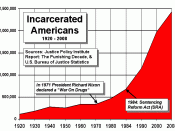Modern sentencing reform, an act of Congress intended to bring balance and justice to offenders and society as a whole, has for the past nineteen years taken the judicial system by storm. Sentencing reform through Federal Sentencing Guidelines by means of mandatory minimums and the fairly new "Three Strikes" law have left a vast abyss of uncertainty for offenders, tied the hands of judges, and at best, given society the chance to express its moral outrage in a manner that is incomprehensibly cruel and inhumane. The aftermath of this novel idea, dreamed up with good intentions, has permanently scarred the criminal justice system with wounds that will heal slowly - if ever.
"The word "maximum" in the next line should be "minimum." (Government Printing Office: 1986) These words of Ronald Regan, spoken in 1986 while addressing Congress about the Federal Sentencing Guideline's error in using the word maximum in the practice of sentencing rather than minimum, would come to life, scaring all that is holy out of federal and state justices for years to come.
The goal: to turn the justice system upside down, force defendants to pay for their crimes like never before, and to remove the discretion at the benches of federal and state judges. The aftermath of these three methods of sentencing reform would be overcrowded prisons, early release programs, unfair prosecutorial powers, and justices leaving the bench out of frustration and a loss of love for a job that was once considered noble.
A reduction in crime by means of incapacitation through detention seemed like a pretty good idea in the early 1980's. The logic behind this being that if we lock up the criminals for extended periods of time, society will be rid of their threat and the offender will be made to pay for...


